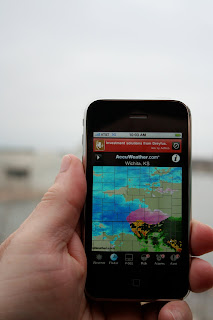The Perils of Long Range Forecasting

During the last decade meteorology has made tremendous progress in forecasting for periods out to 72 hours. However, for periods beyond three days, accuracy falls off considerably. Here is an example of how you can get tremendously different forecasts ten days into the future. The U.S. National Weather Service runs a weather forecasting model that makes forecasts out to 16 days. Here is current forecast for 240 hours into the future (6am Wednesday, December 9): If this forecast is correct, it will be extremely cold in the Rockies and Plains with snow, possibly heavy, in the Mississippi Valley. Now, here is the corresponding forecast for the United States for exactly the same time created by the forecasting model run by the European Consortium for Medium Range Forecasting: The blue lines on this map depict the same values as the black lines on the above chart. You do not have to be a meteorologist to see the pattern is completely different. No cold wave with fair weathe


